This passage is the inspiration for many Christmas cards. images of mangers, stables, angels, shepherds, livestock, hillsides, stars, and cityscapes of Bethlehem. I love Christmas cards. Well, most Christmas cards: please no glitter, no “season’s greetings,” or “happy holidays.”
Christmas cards capture on one small object: the hope and blessing of Christmas. An artist with graphics or words will depict a message or an image that sparks hope, joy, peace, family, and friendship.
The Word of God is God’s Christmas card to the world. The word of God is Heaven’s Christmas Card and depicted on Heaven’s Christmas card is a mural. It begins on the far left with a garden and ends on the far right with a garden tomb.
The mural has images of Patriarchs, Psalmists and Prophets.
On this mural, you'll see Satan strategies.
On this mural, you'll see Man’s messes
On this mural, you'll see God’s Grace.
On this mural, you'll see:
Let me walk down this mural, which is a timeline of 4000 years of God’s grace. The mural begins in a garden. (It will end in a garden too - a garden with an empty tomb.)
The story of Christmas began in a garden on the worst day in human history. The day Adam chose to disobey God’s Word. He took the fruit offered by his wife after she was deceived by the serpent. The day they ate they died and, with that eternally fateful decision, all of humanity died with them, spiritually.
Yet on that day, God held up His Christmas card, as a mural, for us to see 4000 years ahead to a day when God would so love the world of sinful man that He would give a Son, His Son.
“And I will put enmity between thee and the woman, and between thy seed and her seed; it shall bruise thy head, and thou shalt bruise his heel.” Genesis 3:15
And with that fateful decision, the battle was in full array on the battlefield of God’s divine plan for humanity.
Over the next 4000 years, Satan attempted to thwart the plan of God to prevent the moment when the Seed of the Woman would come. Throughout the OT time period, Satan attempted to thwart the plan of God to redeem man to Himself. However, God’s guiding hand was at work. God was simply working out His plan. He would redeem man.
Israel received promises and punishments throughout the 4000-year period. Throughout Scripture, God’s man has stood with heaven’s Christmas card and said, “He’s coming.”
Whether in hard times or hurting times, God reminded humanity, “I have a plan.” Patriarchs, (Jacob) Priests, Prophets, (Daniel, Ezekiel, Isaiah, Jeremiah, Zechariah, Micah, Hosea, Malachi) and Psalmists, stood and held heaven’s message before humanity. They placed the card on the mantle for the family of man to see.
The Patriarch, Jacob, before his death, told his sons that God’s plan was still at work.
“The sceptre shall not depart from Judah, nor a lawgiver from between his feet, until Shiloh come; and unto him shall the gathering of the people be.” Genesis 49:10
Prophets stood in hours of despair and gloom and reminded them of Heaven’s Christmas Card, a view that God’s plan was still at work. Isaiah’s words made it clear that God’s zeal would perform this.
Just two single out two popular prophets: Isaiah and Micah stood before Israel in the darkest of days: “Therefore the Lord himself shall give you a sign; Behold, a virgin shall conceive, and bear a son, and shall call his name Immanuel. For unto us a child is born, unto us a son is given: and the government shall be upon his shoulder: and his name shall be called Wonderful, Counsellor, The mighty God, The everlasting Father, The Prince of Peace. Of the increase of his government and peace there shall be no end, upon the throne of David, and upon his kingdom, to order it, and to establish it with judgment and with justice from henceforth even forever. The zeal of the LORD of hosts will perform this.” Isaiah 7:14; 9:6–7.
“But thou, Bethlehem Ephratah, though thou be little among the thousands of Judah, yet out of thee shall he come forth unto me that is to be ruler in Israel; whose goings forth have been from of old, from everlasting.” Micah 5:2
After 4000 years of displaying the zeal of the Lord of hosts and reminding Israel of God’s plan, He become silent with recorded prophecy for 400 years. The next time we see Heaven’s Christmas card was when the angel arrived to Joseph and Mary. The world had slept long enough. It’s time to raise the Christmas card that would change the world.
“But when the fullness of the time was come, God sent forth his Son, made of a woman, made under the law,” Galatians 4:4
God makes it clear: “I’m choosing you and your espoused. Mary will bear the child of the Holy Ghost. Joseph will rear Jesus, the Seed of the Woman.”
Both Matthew and Luke get us started by telling us the heritage lines of Jesus. Both Mary and Joseph were in the royal line of David.
Matthew lists 42 generations. Matthew starts with Abraham and goes to Jesus.
Luke gives 76 names. Luke with Adam. Luke starts with Jesus and goes to God.
Mary is clearly the mother. Joseph is not his father.
Matthew speaks of 5 women. Two were prostitutes, one an adulterer, one a foreigner, and the fifth one, Mary, in the place of grace, was highly favored. She is Mary of whom Jesus was born.
This all came to be God’s plan because He Himself performed with the zeal of the Lord of hosts.
God’s plan for redeeming mankind is what Christmas is all about.
Prophet’s dreams, visions, and prophecies all intersect in this moment.
Alas, according to the prophecies, humanly speaking, Joseph and Mary are not in the right place.
But remember, the hearts of kings are in God’s hands. He will use the greed of leaders to mobilize this unlikely couple to Bethlehem. They arrive to Bethlehem to find the oft-rehearsed and poetic moment of there being no room in the Inn. Could the plan of God not have included a reservation at the Inn?
But this birth would be marked not by opulence and splendor. No, His birth would be marked with humility and simplicity. This birth would be fitting for the Lamb of God: a manger.
In just moments, heaven’s chorus of voices arrived to unlikely group of shepherds who received a personal view of Heaven’s Christmas card. They rushed to see this sight. The Lamb of God’s announcement came to shepherds who were the first to herald this news.
Hundreds of miles away, wise men just saw a star. It’s a star unlike any other star. They mounted up and journeyed toward Israel. They traveled from the Northeastern regions of Babylon. All within the plan of God to get the family from Bethlehem to Nazareth, thereby, fulfilling prophecy.
God’s Christmas card, this mural, is not just about images. You see, this huge mural, like most Christmas cards, opens to a message within it. God’s Christmas card has a message: John 3:16
“For God so loved the world, that he gave his only begotten Son, that whosoever believeth in him should not perish, but have everlasting life.”
What is the message on God's Christmas card?
It is the message that:
God Loved.
God loved a world that sinned.
God loved a world that strayed.
God loved a world that sank.
God loved the places in the world.
God loved the people in the world.
God loved the potential in the world. (looked beyond our fault)
God Gave. The first Christmas gift was the first missions offering.
God gave a precious gift.
God gave a priceless gift.
God gave a personal gift.
God gave a powerful gift.
God Promised.
God Promised to deliver for whosoever.
God Promised to deliver from death.
God Promised to deliver to everlasting
What about you today? Are you aware that God loved, God gave, God promised?
He gave to you. Whom He loved is you. What He promised is everlasting life.





















